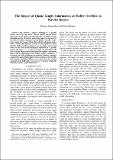| dc.contributor.author | Modiano, Eytan H | |
| dc.contributor.author | Jagannathan, Krishna Prasanna | |
| dc.date.accessioned | 2018-05-07T14:18:00Z | |
| dc.date.available | 2018-05-07T14:18:00Z | |
| dc.date.issued | 2013-06 | |
| dc.identifier.issn | 0018-9448 | |
| dc.identifier.issn | 1557-9654 | |
| dc.identifier.uri | http://hdl.handle.net/1721.1/115238 | |
| dc.description.abstract | We consider a system consisting of N parallel queues, served by one server. Time is slotted, and the server serves one of the queues in each time slot, according to some scheduling policy. We first characterize the exponent of the buffer overflow probability and the most likely overflow trajectories under the Longest Queue First (LQF) scheduling policy. Under statistically identical arrivals to each queue, we show that the buffer overflow exponents can be simply expressed in terms of the total system occupancy exponent of $m$ parallel queues, for some m ≤ N. We next turn our attention to the rate of queue length information needed to operate a scheduling policy, and its relationship to the buffer overflow exponents. It is known that queue length blind policies such as processor sharing and random scheduling perform worse than the queue aware LQF policy, when it comes to buffer overflow probability. However, we show that the overflow exponent of the LQF policy can be preserved with arbitrarily infrequent queue length updates. | en_US |
| dc.description.sponsorship | National Science Foundation (U.S.) (Grant CNS-0626781) | en_US |
| dc.description.sponsorship | National Science Foundation (U.S.) (Grant CNS0915988) | en_US |
| dc.description.sponsorship | United States. Army Research Office. Multidisciplinary University Research Initiative | en_US |
| dc.publisher | Institute of Electrical and Electronics Engineers (IEEE) | en_US |
| dc.relation.isversionof | http://dx.doi.org/10.1109/TIT.2013.2268926 | en_US |
| dc.rights | Creative Commons Attribution-Noncommercial-Share Alike | en_US |
| dc.rights.uri | http://creativecommons.org/licenses/by-nc-sa/4.0/ | en_US |
| dc.source | MIT Web Domain | en_US |
| dc.title | The Impact of Queue Length Information on Buffer Overflow in Parallel Queues | en_US |
| dc.type | Article | en_US |
| dc.identifier.citation | Jagannathan, Krishna, and Eytan Modiano. “The Impact of Queue Length Information on Buffer Overflow in Parallel Queues.” IEEE Transactions on Information Theory 59, no. 10 (October 2013): 6393–6404. | en_US |
| dc.contributor.department | Massachusetts Institute of Technology. Department of Electrical Engineering and Computer Science | |
| dc.contributor.department | Massachusetts Institute of Technology. Department of Aeronautics and Astronautics | |
| dc.contributor.department | Massachusetts Institute of Technology. Laboratory for Information and Decision Systems | |
| dc.contributor.department | Massachusetts Institute of Technology. Operations Research Center | |
| dc.contributor.mitauthor | Modiano, Eytan H | |
| dc.contributor.mitauthor | Jagannathan, Krishna Prasanna | |
| dc.relation.journal | IEEE Transactions on Information Theory | en_US |
| dc.eprint.version | Original manuscript | en_US |
| dc.type.uri | http://purl.org/eprint/type/JournalArticle | en_US |
| eprint.status | http://purl.org/eprint/status/NonPeerReviewed | en_US |
| dc.date.updated | 2018-04-06T12:46:47Z | |
| dspace.orderedauthors | Jagannathan, Krishna; Modiano, Eytan | en_US |
| dspace.embargo.terms | N | en_US |
| dc.identifier.orcid | https://orcid.org/0000-0001-8238-8130 | |
| mit.license | OPEN_ACCESS_POLICY | en_US |
